Picture
Your Present Location: HOME> PictureRDCY holds a seminar on financial reform and development in modern financial system
On July 13th, a seminar on “Financial Reform and Development in Modern Financial System” and financial analysis meeting of Financial Research Center of State Council Counselors’Office for the first half of 2018, jointly hosted by Financial Research Center of State Council Counselors’Office and Chongyang Institute for Financial Studies at Renmin University of China (RDCY), was held in Beijing.
The seminar was held on the first anniversary of China’s Fifth National Conference of Financial Work, attracting a number of well-known experts and scholars from the financial field to gather together to study and judge the financial situation in the first half of the year and discuss China's future financial strategy.During the conference,a research report was released with the theme of "Reinvigorating China strategy from the Perspective of Finance: Historical experience, theoretical guidance and future layout".
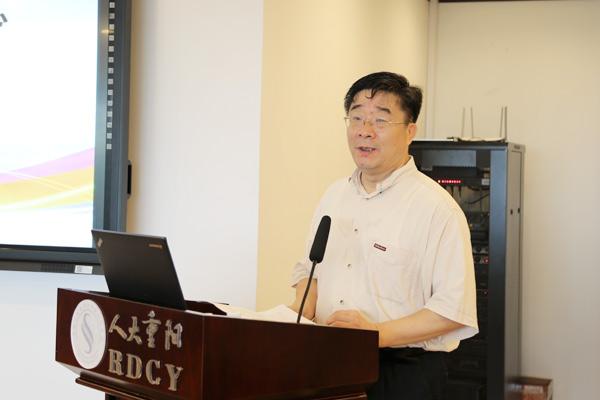
Liu Wei, president of RUC
Liu Yuanchun, vice-president of Renmin University of China (RUC) and executive committee of RDCY, moderated the seminar. Liu Wei, president of RUC, and Liu Ping, director of Office of Counselors of People’s Bank of China and Financial Research Center of State Council Counselors’ Office, made opening remarks at the conference.
President Liu Wei first stated the importance of financial reform to the critical period of China's development and the problems that may be encountered in the development process. He also stressed that finance is a necessary condition for the rise of a big country and needs to form and improve the foundation of a sound financial system.
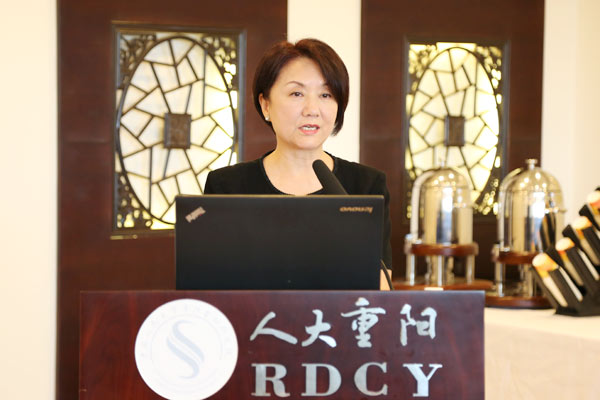
Liu Ping, director of Financial Research Center of State Council Counselors’ Office
Professor Liu said that finance is one of the earliest, strongest and most influential subjects of RUC, and has made pioneering and ground-breaking contributions to the development of the study of finance of China. The cooperation between RDCY and the Financial Research Center of the State Council Counselors’ Office can be deepened. The research results of both sides will also play important roles in deepening financial reform and make significant contributions in promoting China's economic and social development.
Liu Ping reviewed the process of China's financial reform and opening up and pointed out that although China's financial reform has made remarkable achievements, it still needs to speed up the construction of a modern financial system to prevent major financial risks.
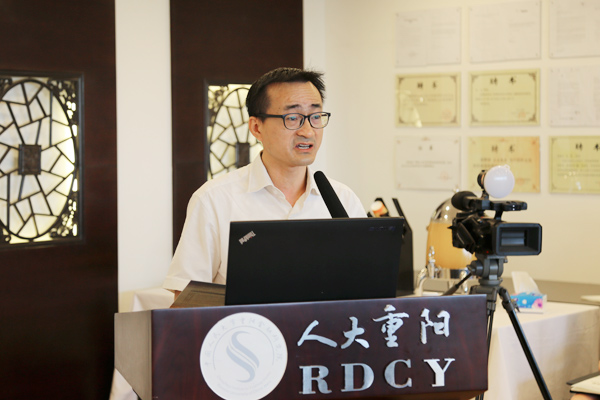
Liu Yuanchun, vice-president of RUC
Liu then explained the importance role of the Civil Code to China's financial market from legal perspective. She said that the world today is undergoing unprecedented changes, huge adjustments, and great conflicts. The world economy is full of boundless hopes and glorious visions, but it also faces many uncertainties and severe challenges. We have a long way to go in building a modern financial system.
Wang Wen, executive dean of RDCY, released the think tank report on “Reinvigorating China strategy from the Perspective of Finance: Historical experience, theoretical guidance and future layout”. The report analyzes the necessities of finance for building a strong country from both theoretical and historical dimensions. Finance creates a huge impetus for the soft power of the entire country, and historical powers rely on strong financial systems to maintain their international status. The report puts forward the impacts of the financial conditions for China’s strategy through the analysis of domestic and international financial systems and regulatory mechanisms.
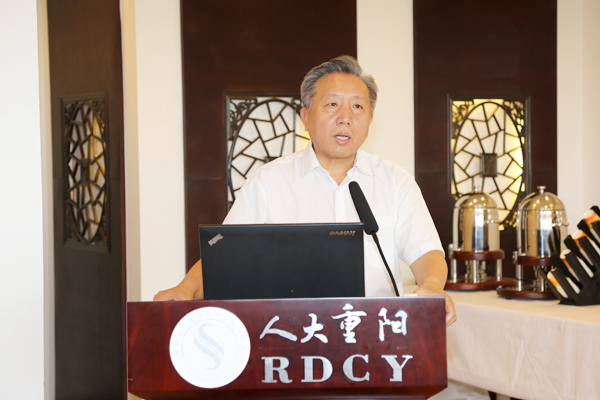
Wu Xiaoqiu, vice-president of RUC
The report concludes with a summary of China's opportunities and challenges, as well as suggestions on the road to becoming a financial power.
First, we should understand the importance of finance to the country's economic development and social stability at a height of national strategy, formulate a financial power strategy, improve the international competitiveness of China's financial industry, and safeguard national financial security.
Second, strengthening the real economy and improving the efficiency of the financial services in real economy to achieve a positive interaction between finance and economic development.
Third, on the basis of facilities and environment construction, we will consolidate the construction of financial infrastructure to ensure the safe and efficient operation of the financial market and overall stability.
Fourth, promoting the leap-forward development of the e-finance industry through technological innovation in order to solve the core problems in the financial sector, thereby accelerating the transformation process of the traditional financial sector by using the internet.
Fifth, enhancing international financial cooperation in participating in global financial governance, with the aim to promote the rights to speak in international financial organizations.
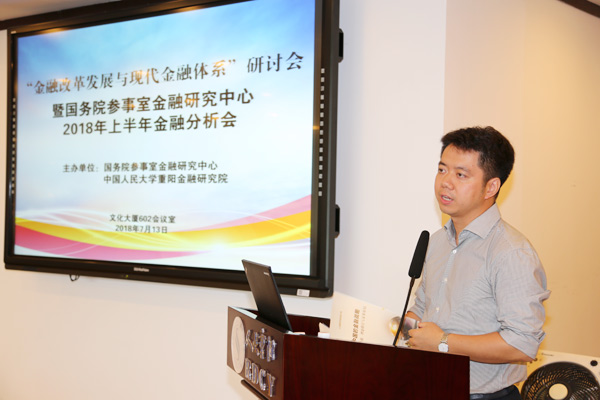
Wang Wen, executive dean of RDCY
After the conference, the participating experts conducted a closed-door discussion on the two issues of “Analysis of the financial situation in the first half of the year and the outlook for the second half of the year” and “Impact assessments of the Sino-US trade war on the construction of a modern financial system of China”.
Wu Xiaoqiu, vice president of RUC, gave a speech at the luncheon. He said that promoting the internationalization, marketization and scientificization of China's finance is the basic direction of our financial reform. He particularly emphasized that the most important role of finance is to create a series of tools to defend against portfolio risks, which is the core of the modern financial system.
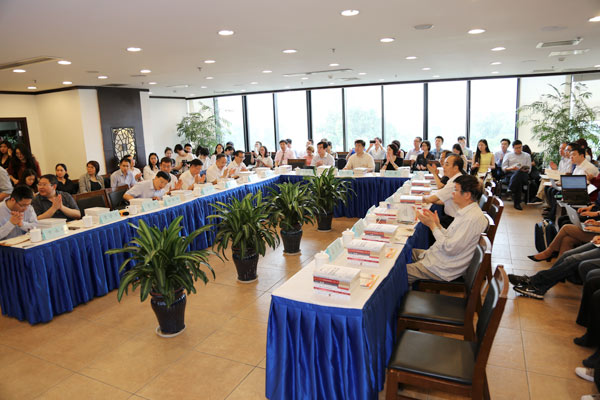
The seminar was held at RDCY
Several other experts, including Cai ESheng, former president of China’s Securities Regulatory Commission and researcher of Financial Research Center of the State Council Counselors’ Office, Zhou Yanli, former vice president of China’s Insurance Regulatory Commission and researcher of Financial Research Center of the State Council Counselors’ Office, Zhang Yanling, former executive vice president of Bank of China and senior fellow of RDCY, Fang Shangpu, counselor of People’s Bank of China, Ding Zhijie, vice president of University of International Business and Economics, Wei Jianing, inspector and researcher of Financial Research Center of the State Council Counselors’ Office, Liu Yong, chief economist of China Development Bank, Yu Pingkang, chief financial expert of the Insurance Association of China, Liu Zhiqin, senior fellow of RDCY, Zhang Shaohua, secretary general of Financial Research Center of the State Council Counselors’ Office, Zhao Xijun, deputy dean of the School of Finance at RUC and senior fellow of RDCY, Mu Huaipeng, counsellor of People’s Bank of China, Wang Min, former counsellor of People’s Bank of China, Wang Guangqian, former president of Central University of Finance and Economics, Zhang Jie, director of International Monetary Institute of RUC, Tang Huadong, deputy director of State Council Counselors’ Office, Liu Xiliang, professor of Southwestern University of Finance and Economics, Jia Jinjing, chief researcher of RDCY, and Bian Yongzu, researcher of RDCY, attended the seminar.























































































 京公网安备 11010802037854号
京公网安备 11010802037854号





